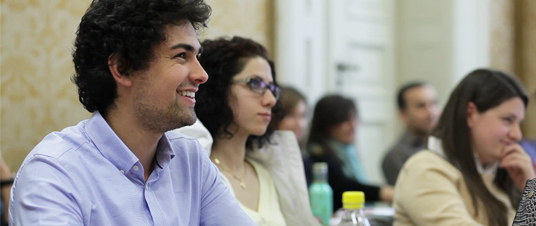
Program Details
Studying full-time, you earn the Master's degree in less than a year. The Masters of Applied Economics program is career-oriented but it is also academically demanding. Graduates leave the program confident in the skills they have mastered through our careful attention to quality teaching.
"One of the reasons I chose the MAE program is it only lasts a year. After that I can continue my education or find a job."
Katarina Kovac, MAE graduate 2013
Academic Calendar for MA Program
Masters of Applied Economics academic calendar 2013-2014.
The exact calendar is announced each year, but this is an indication of the typical calendar in the Masters of Applied Economics program:
| March 31 | Application deadline for applicants who need an EU visa |
| July and August | Online Preparatory Semester |
| Mid-September to mid-December | Fall Semester |
| Mid-December to mid-January | Winter Break |
| Early January to beginning of April | Spring Semester |
| Beginning of April to mid-April | Spring Break |
| Mid-April to mid-July | Summer Semester |
| End of July | Graduation |
Course Schedule for MA Program
| Fall | Spring | Summer | |
|---|---|---|---|
| Core Courses | Applied Microeconomic Analysis | Quantitative Methods 2 | Project Seminar |
| Macroeconomic Policy Analysis | Technical Communication for Economists 2 | Project Porlfolio | |
| Quantitative Methods 1 | |||
| Technical Communication for Economists 1 | |||
| Elective Courses | Elective 1 | Elective 4 | |
| Elective 2 | Elective 5 | ||
| Elective 3 | Elective 6 | ||
| Elective 7 |
Each course from Masters of Applied Economics Program meets twice a week; classes are 90 minutes each. Courses often have an additional 90-minute exercise session. If possible, no classes are scheduled on Fridays.
Sample Fall Semester weekly class schedule for Masters of Applied Economics Program can be downloaded here.
Through their choice of electives, students can qualify for a particular Specialization. The exact electives offered each semester depend on enrollment and student interest.
Specializations and Electives for MA Program
Below are some examples of the Specializations that can be gained through the electives you choose. The Specialization is in addition to the Masters of Applied Economics degree. Usually a Specialization is granted if a student takes at least three courses listed under a Specialization.
Typically a variety of electives is offered each Spring and Summer Semester. However, the electives offered can vary from year to year, depending on student interest.
|
Financial Economics
|
Public Policy
|
|
Macroeconomics and Forecasting
|
Corporate Economics
|

Fall Semester: mid-September to mid-December
The Masters of Applied Economics program starts with the Fall Semester (mid-September to mid-December). All students take the same set of four core courses: Macroeconomic Policy Analysis, Applied Microeconomic Analysis, and the first of a two-course Quantitative Methods series that teaches students important, practical, quantitative research skills. Students also attend the first course of the Technical Communication for Economists series both to increase their general knowledge and ability in English and to better perform on high-level professional tasks in English.
Spring Semester: early January to early April
Students finish the two-part Quantitative Methods series and continue with the second Technical Communication for Economists course in the Spring Semester (early January to early April). Students also enroll in three electives.
Summer Semester: mid-April to mid-July
In the Summer Semester (mid-April to mid-July), students take another four electives. Required courses include the Project Seminar and the Project Porfolio. The Project is a “capstone” text that should reflect the student’s best work in the Masters of Applied Economics program and should use the knowledge and skills gained in other Masters of Applied Economics courses. The Project should show how a student can respond to a specific applied economics task. In this way it shows what most students will be doing after graduation, when they have a professional position as an analyst, economist, or consultant.
Thesis for Masters of Applied Economics Degree
Completing a thesis is not required to gain the Masters of Applied Economics degree, and normally is not part of the program. A student may choose to do a thesis if the student wants a more research-intensive education or if the student has reason to believe the degree will not be nostrified without a thesis.
The requirements and procedure for completing the thesis are agreed upon for each student’s individual needs. The student will need to have a faculty supervisor and the Program Director has to approve the study plan.
The thesis is always completed after all other courses are finished. A student who completes a thesis still has to complete the Project Seminar and write the Project.
Students are not required to be resident in Prague when they are doing their theses. It is possible to graduate with the Masters of Applied Economics degree, receive the diploma, and complete the thesis afterwards. Student status and long-term visa documentation is not provided while writing the thesis.

Graduation Requirements for MA Degree
The Masters of Applied Economics program consists of 5 content courses (including the Project Seminar), 3 Technical Communication for Economists courses, and 7 electives. Students must pass all the courses to gain the MAE degree. Courses are evaluated on the American letter-grade scale: A, B, C, D, F, with “+” or “–" possible for each grade except F. A passing grade is any grade except F.
Students must pass all courses within four calendar years from the start of the program. For example, if a student starts in September 2014, the student must pass all courses by the end of August 2018.
If a student fails a course, it is possible to make up the course to gain the necessary passing grade. Students must pay additional tuition for the make-up course. If a student fails an elective course, the student can replace that grade with a passing grade in another elective course for the purposes of graduation.
Students who do not follow the payment schedule, cannot graduate and do not get the MAE degree.
Grades in the Preparatory Semester are not officially recorded, and thus are not included in the Graduation Requirements.
Preparatory Semester for MA Program
Masters of Applied Economics students take Preparatory Semester courses before the beginning of the Masters of Applied Economics program. The goal of the Preparatory Semester is to make sure all admitted students are prepared to succeed in the Masters of Applied Economics program from the very beginning. The Preparatory Semester courses are not officially recorded for the Masters of Applied Economics degree program.
Dates: beginning of July to end of August.
The Preparatory Semester runs for eight weeks. It is designed as part-time study, so you can still work or study during this time. It does not take much time to complete for applicants who are already well-prepared. For less-prepared students, the Preparatory Semester helps familiarize you with the principles of economics and allows you more practice in English to succeed in the Masters of Applied Economics program.
The Preparatory Semester is offered in an online format. Preparatory Semester courses:
- Mathematics for Economics
- Applied Economics
- Applied English Skills
Faculty
We have an international faculty; all CERGE-EI Economics faculty hold PhDs from U.S. or Western European universities.
Teachers in the Masters of Applied Economics program include both CERGE-EI permanent faculty and professional working in the fields taught in the program. Students therefore learn from teachers who are both well-respected researchers as well as experienced professional practitioners.
The permanent faculty in our unique Academic Skills Center teach the Technical Communication for Economists series.
Quality teaching is paramount to the Masters of Applied Economics program. Teachers are regularly assessed and student evaluations are taken seriously.
"Here you feel like people can still pursue their dream and make their own company and find their own way and be self-sufficient."
Andrew Pribram-Riddell, MAE Graduate 2013









